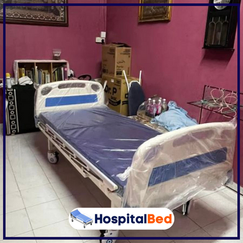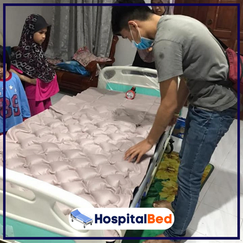5 Signs Your Baby May Need a CPAP Machine
- Ain W.
- Sep 22, 2025
- 3 min read
Table of Contents

Introduction
Breathing problems during sleep might be more serious than you think.
If your baby frequently struggles to breathe at night, they might be suffering from a sleep disorder like obstructive sleep apnea (OSA). One of the most effective treatments for this condition is the use of a CPAP (Continuous Positive Airway Pressure) machine. But how do you know when it's necessary?
Here are 5 signs that your baby may benefit from a CPAP machine—and why acting early is essential.
1. Frequent Pauses in Breathing
Notice long gaps between breaths?
This is one of the most alarming signs. If your baby regularly stops breathing for 10 seconds or more during sleep, this could indicate sleep apnea. A CPAP machine helps keep their airway open throughout the night.

2. Loud Snoring or Noisy Breathing
Snoring in babies isn't always cute.
Persistent snoring or noisy breathing—especially if it's accompanied by gasping—can signal airway blockage. This might mean your baby's airflow is restricted and may require intervention with a CPAP.
3. Poor Weight Gain or Feeding Issues
Not gaining enough weight?
Babies who struggle to breathe at night often have poor sleep quality, affecting feeding habits and weight gain. They may get tired quickly during feeds, leading to inadequate nutrition.
4. Constant Fatigue or Irritability
Is your baby always tired or cranky?
Disrupted sleep can lead to extreme daytime sleepiness and mood changes. If your baby seems unusually irritable or drowsy during the day, it could be linked to nighttime breathing problems.

5. Diagnosed with Obstructive Sleep Apnea (OSA)
Already have a diagnosis?
If your pediatrician or sleep specialist has diagnosed your baby with OSA, a CPAP machine is often the next step in treatment. It ensures your baby gets enough oxygen and restful sleep every night.
Did You Know?
Sleep apnea can begin as early as infancy.
Untreated sleep apnea can lead to developmental delays.
CPAP therapy has shown significant improvement in sleep quality and oxygen levels in infants.
Some CPAP machines are specially designed for infants and are gentle and quiet.
Conclusion
Early signs of sleep apnea should never be ignored. If your baby shows any of the signs above, consult your pediatrician or a sleep specialist immediately. A CPAP machine might be the solution to improve your baby’s sleep and overall health.
FAQ
1. Is it safe for a baby to use a CPAP machine?
Yes, under medical supervision, infant-specific CPAP machines are safe and effective.
2. How do doctors diagnose sleep apnea in babies?
Diagnosis typically involves a sleep study called polysomnography.
3. Can sleep apnea go away on its own in babies?
In some mild cases, yes. However, many need intervention like CPAP or surgery.
4. What are the risks of untreated sleep apnea in babies?
Possible risks include poor growth, developmental delays, and heart complications.
5. How do I get a CPAP machine for my baby?
You’ll need a prescription from a pediatric sleep specialist after diagnosis.
Is Your Baby Struggling with Sleep? 💤
Take action today! If any of these signs sound familiar, don’t wait—book a consultation with a pediatric sleep specialist. You can also WhatsApp us now for a quick, no-obligation chat or schedule an appointment online. Get peace of mind and better sleep for your little one. 🌙👶
P.S. We Also Provide Medical Beds for Home Use 🛏️
Comfort matters—especially when your baby or loved one needs extra care at home. In addition to CPAP machines, we also supply high-quality medical beds designed for home environments. Whether it's for better positioning, easier caregiving, or enhanced comfort, our adjustable medical beds make a big difference.
👉 Learn more about our medical beds or chat with us on WhatsApp to find the right model for your needs.
Better sleep. Better care. All in one place.














Comments